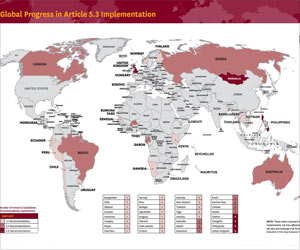The WHO and other key agencies have recognized that tobacco industry interference as one of the biggest obstacles in turning the tide of the tobacco pandemic.

Adoption of WHO FCTC Article 5.3 guidelines in November 2008 by countries that have ratified the global tobacco treaty was undoubtedly a major milestone in tobacco control. FCTC Article 5.3 was globally recognized as a backbone of the global tobacco treaty. Since 2008, there is a growing recognition of the fundamental and irreconcilable conflict of interest between tobacco industry and public health policy, and countries are at different levels in implementing it domestically.
Gaining Momentum
"FCTC Article 5.3 has been gaining momentum over the last few years. We are talking more of it at this conference as well as during last COP6 (Sixth Conference of the Parties to the WHO FCTC in October 2014). Everyone is now talking of tobacco industry interference and recognizing that the tobacco industry is posing the greatest obstacles to implementing FCTC. That being said, FCTC Article 5.3 is still not fully recognized by many governments and civil society as the backbone and the most crucial element of the treaty. We need more funding for prioritizing and implementing FCTC Article 5.3 in many countries" said Cloe Franko, Chair of Network for Accountability of Tobacco Transnationals (NATT) and Senior Organizer, Challenge Big Tobacco campaign, Corporate Accountability International.
Cloe Franko shared a "Roadmap to protecting health from Big Tobacco" produced by Corporate Accountability International last year. This roadmap is a step-by-step guide to assist public officials and advocates in translating FCTC Article 5.3 guidelines into laws, policies, and enforcement mechanisms.
Franko said that there are 10 countries that strongly meet one or more of the FCTC Article 5.3 guideline recommendations.
Advertisement
Irene Reyes, a Bloomberg Awardee in tobacco control, and Managing Director of Health Justice Philippines, said that despite tobacco industry pressures, her country has been able to make some headway in implementing FCTC Article 5.3. In 2010 a joint memorandum circular (JMC) was issued by Civil Service Commission (CSC) and Department of Health. An Article 5.3 Committee was also formed that raised awareness of the government on tobacco control and tobacco industry interference. This has resulted in some successes. Over a period of time Article 5.3 policies have been adopted by many departments.
Advertisement
Ghana
Labram Musah, Programme Director of Vision for Alternative Development (VALD) and a NATT leader from Ghana said: Tobacco industry has been constantly trying to undermine efforts for FCTC implementation in Ghana. It influenced the recent decrease in tobacco taxation to 33% instead of 50%. It is also trying to influence CSR policy through Ministry of Trade and Industry. It is also hiding behind tobacco industry front groups and economic think-tank groups such as ’Imani Ghana’, to champion its argument. It is demanding a seat at the table with the claim of being a stakeholder when tobacco control policies are being developed. It is trying to interfere at higher governmental levels too.
Nepal
Tara Singh Bam from International Union Against Tuberculosis and Lung Disease (The Union) said that we need WHO FCTC Article 5.3 to protect the current achievements that Nepal has made on tobacco control. We must not lose the gains made in public health and succumb to industry interference. Nepal is all set to implement landmark tobacco control measures from 15th May 2015 which includes 90% pictorial graphic health warnings on tobacco packs and measures on line of FCTC Article 5.3 nationally. Not surprisingly, Nepal was also awarded the prestigious Bloomberg Award at WCTOH 2015.
ASEAN Countries
Mary Assunta, Luther Terry Awardee and Senior Policy Advisor, South East Asia Tobacco Control Alliance (SEATCA) shared how SEATCA assessed levels of tobacco industry interference in ASEAN countries. Brunei, Laos, Malaysia and Thailand in this region do not allow tobacco industry to sit in multisector community/advisory groups that set public health policy. However tobacco industry corporate social responsibility (CSR) is not banned in ASEAN countries.
Is Tobacco Industry Interference- Corruption?
Safeguards enshrined in FCTC Article 5.3 are arguably among the most effective measures that governments can implement to speed p the implementation of all of the other areas of the treaty. These measures are in effect anti-corruption measures, said Mary Assunta. She referred to a primer on tobacco control and good governance, jointly brought out by Corporate Accountability International and SEATCA in August 2014, which further underlines this case.
There is congruency between indicators used to monitor corruption and FCTC Article 5.3 guidelines. Assunta gave few examples to illustrate this congruency: "protecting against policy manipulation for profit" is a corruption indicator, and "safeguarding public health policy making from tobacco industry" is a FCTC Article 5.3 indicator. Likewise, "bribing/ financial disclosure" is a corruption indicator, and "government officials should not take money from or invest in tobacco industry" is a FCTC Article 5.3 indicator. "Transparency of dealings and decision-making" is a corruption indicator, and "transparency in interactions between tobacco industry and government" is a FCTC Article 5.3 indicator.
No Time To Lose: Firewall Health Policy And Enforce FCTC
Let’s remind ourselves again, that governments that have ratified the global tobacco treaty (FCTC) had adopted the FCTC Article 5.3 guidelines in November 2008. The WHO and other key agencies have recognized that tobacco industry interference as one of the biggest obstacles in turning the tide of the tobacco pandemic. Recognizing how critically important it is to firewall public health policy and FCTC implementation from tobacco industry interference, lot more work should have happened globally in rolling FCTC Article 5.3 on the ground.
Shobha Shukla, Citizen News Service (CNS)
Source-Medindia















